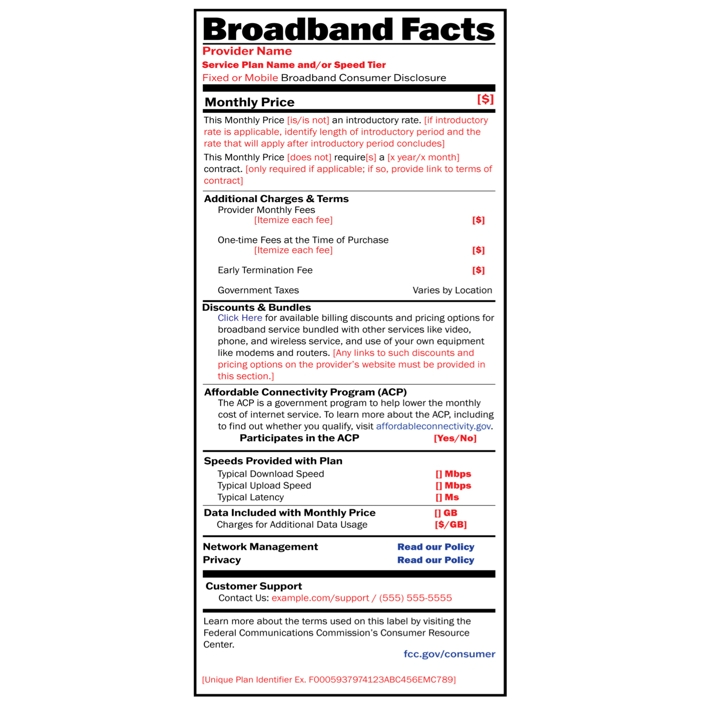FCC Holds ISPs' Feet to the Fire With Broadband 'Nutrition Labels'
Just how "healthy" is your broadband internet plan?
Are you often frustrated by the lack of transparency regarding available broadband services in your area? Well, the Federal Communications Commission (FCC) has heard your complaints and is taking steps to provide consumers with a wealth of information about internet service providers (ISPs) before you take the plunge with a contract.
This week, the FCC unveiled easy-to-understand labels called "Broadband Facts," which are similar in concept to nutrition labels found on packaged foods in U.S. grocery stores. Customers can view pertinent details about broadband services, including service pricing, overage fees, data throttling limits, etc.
The FCC mandates that these labels be placed "in close proximity to an associated plan advertisement" to ensure maximum visibility. In addition, the full label must be on full display, and ISPs won't be able to get away with simply placing a link on its website that the customer must click to read the full details.
Other essential details arising from this new initiative include making the data available to third parties so that consumers can make more informed decisions while comparison shopping. The broadband plan labels must also be accessible from a customer's account portal when logging in online. Given that the FCC states that the labels be present at the point of sale, we'd imagine that they will be prominently displayed at brick-and-mortar locations for ISPs like Comcast, Spectrum and Verizon, for example.
Taking a closer look at the label, there are sections on the monthly rate for the plan and whether it represents special promotional pricing that will expire after a set number of months/years. There are also provisions to describe any activation fees, one-time or monthly equipment fees, the associated early termination fee (if any) and the amount of government taxes that will be applied to each monthly bill.
ISPs usually love to tout their download speeds in their advertising and then place their upload speeds in small print. They do this because cable providers often offer upload speeds that are much lower than the downloads. For example, my current cable internet plan offers 500 Mbps downloads, but upload speeds are capped at 25 Mbps. Thanks to the FCC, download and upload speeds must now be displayed along with "typical" latency on the Broadbands Facts label. In addition, true unlimited data is becoming a rarity with U.S. home broadband plans, so there's also a section that details how much data you're allotted per month (in gigabytes) and how much you'll be charged per gigabyte for going past that limit.
"Broadband is an essential service, for everyone, everywhere. Because of this, consumers need to know what they are paying for, and how it compares with other service offerings," said FCC chairwoman Jessica Rosenworcel. "For over 25 years, consumers have enjoyed the convenience of nutrition labels on food products. We're now requiring internet service providers to display broadband labels for both wireless and wired services. Consumers deserve to get accurate information about price, speed, data allowances, and other terms of service up front."
Get Tom's Hardware's best news and in-depth reviews, straight to your inbox.
Overall, this seems like a long overdue change to help consumers make more informed decisions when comparing and selecting a new broadband service -- even if the label looks a bit cheesy. Well, that is if you even have the option to pick from more than one broadband provider in your area. Most Americans only have access to one fixed-line broadband provider, although wireless options from ISPs like Verizon and T-Mobile are also starting to expand their reach across the U.S. However, even those services have issues of their own concerning service reliability.
Consumer Reports and The Verge recently examined over 22,000 U.S. broadband bills submitted by readers. They found that most households spend between $65 to $75 per month on broadband service compared to an average of $40 in London and $31 in Paris. Frontier Communications, on average, had the lowest monthly bill at $53, while Viasat had the highest at $117.

Brandon Hill is a senior editor at Tom's Hardware. He has written about PC and Mac tech since the late 1990s with bylines at AnandTech, DailyTech, and Hot Hardware. When he is not consuming copious amounts of tech news, he can be found enjoying the NC mountains or the beach with his wife and two sons.
-
Giroro I don't think this is perfect but, meh, it's better than nothing. It would be more helpful if it was more of a Zillow-style map/database to show you exactly which legally-enforced ISP monopoly controls your property and what service technology you can expect. The kind of thing that can easily warn an average person exactly how overpriced/obsolete their internet will be if they accidently move into the wrong state, city, or neighborhood.Reply
"ISPs usually love to tout their download speeds in their advertising and then place their upload speeds in small print "
Unless you're comcast, where the upload speeds are often not published on any plan description, company website, or advertising, - until you read the fine print of the contract itself, only accessible at time of signing/payment.
So, this weird ugly "nutrition label" would at least help solve that one specific problem. -
rluker5 I wouldn't mind if the FTC were doing this, but it seems like the FCC is just trying to claim ownership and management authority over all ISPs again just like they tried with Net Neutrality. They are just telling the ISPs to do something that may be popular to establish that they have rightful control over them. They don't have the authority.Reply
The mother of all US gov censorship, the FCC is far too political to be trusted with management authority over all internet service providers in the US.
A handful (5 to be exact) of political appointees should not have the power to tell any and all internet distributors "Do exactly as I say or I will shut your business down"
Perhaps if we didn't just finally get the news that politically motivated departments of the gov was directing censorship on social media to affect the outcome of an election I might not be so wary.
Normal people cannot trust the FCC. This is just an underhanded power grab.
The goal is to control the flow of information. That goal should not be reached by any administration. It should remain in the hands of the people. -
Alvar "Miles" Udell It's a step in the right direction, though if it were me making the rules under "typical" download and upload, it'd list "minimum" download and upload speeds, which is what really matters, especially for cable and satellite connections, with a penalty attached if speeds drop below their minimums.Reply -
Kamen Rider Blade Reply
It hasn't gone far enough.Elusive Ruse said:Any regulation that holds ISPs to some form of transparency has my vote!
STRIP all Major ISP's of the "Last Mile" in every part of the US.
Confiscate the ownership of the communication lines that the "BIG ISP" monopoly has used those lucrative tax breaks from the late 1990's to buy each other up instead of wiring every house with Fiber Optics.
Have the "Last Mile" within every major area of the US be local municipal Telecom utility that gives you EVERY form of Broadband.
Follow the Ammon Idaho model "Virtual ISP" model.
The local municipal Telecom utility will handle all billing, no ISP will be allowed to touch your credit card or personal info.
Screw the big ISP's.
Let them handle connection between the main trunks of the internet and each major region ONLY.
Force competition at Gun Point if you have to.
Have a USPS equivalent of ISP in each region to MAKE SURE that there is cheap Broadband. -
hotaru251 Reply
if they don't the ISP do shady crap.rluker5 said:A handful (5 to be exact) of political appointees should not have the power to tell any and all internet distributors "Do exactly as I say or I will shut your business down"
they can't trust ISP either.rluker5 said:Normal people cannot trust the FCC. This is just an underhanded power grab.
Its a "pick your poison" and imho (based on prior experience with isps over few decades) i'll risk gov keeping em in line.
all it is doing is making the ISP have to be upfront about details of plan they usually keep buried in legalese most ppl wont read.rluker5 said:The goal is to control the flow of information. That goal should not be reached by any administration. It should remain in the hands of the people.
and FCC isnt ajit pai (aka sheet pai) anymore so its a LOT less corrupt than prior. -
rluker5 I like the Internet as it is and don't want it made worse by politicians promising the moon if just given control over it, then delivering what suits them best after they have the power over it. ISPs monitor and control your internet traffic, mine as well. Our freedom of speech should not be for sale to the corp with the deepest lobbyist pockets, or whatever gov wants heard or not.Reply
Politicians make many promises. They don't keep too many. Right now the internet is better than it ever has been. Don't fix what isn't broke. -
rluker5 A few years back 3 of the 5 FCC commissioners (including Pai) voted to stop the push to establish internet service providers as under their regulatory jurisdiction under some 1920s title 2 phone company law. And the FCC has had no regulatory jurisdiction over ISPs ever since.Reply
This "nutrition label" is the politicized FCC just assuming power over the ISPs with nothing to back it up other than the threat of endless legal bills and gov harassment. Basically claiming "your ISP belongs to us now". They will do it until a court stops them, or if they are ignored and they see it isn't working. And if they get this they will come back for more.
Regardless of whether the clarity of bills is an issue that needs to be addressed, the way it has been done here is not a good thing.
